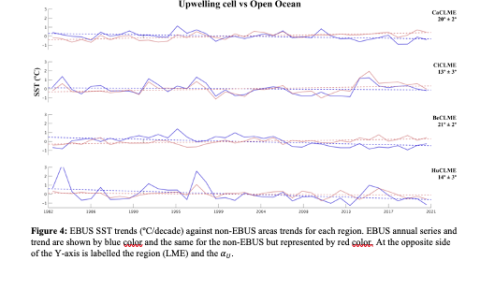Ph.D. Program in Oceanography and Global Change at the Canary Islands, Spain
Submitted by ignacio on Wed, 05/25/2022 - 09:58

The Eastern Boundary Upwelling Systems (EBUSs) provide valuable natural resources due to the high primary production, however anthropogenic forces could affect directly the basis of these ecosystems: the upwelling. Therefore, assessing the impacts of Global Warming on the upwelling processes is crucial for efficient ecosystem management. In spite of that, there is high uncertainty about the future of these upwelling systems under climate change. In 1990, Bakun suggested an increase in the intensity of upwelling due to an increase in the ocean-land pressure gradient. To elucidate the evolution of these ecosystems, this study uses deseasonalized sea surface temperature (SST) data from remote sensing as a proxy for the effect of the upwelling; validate used in-situ observations. The trends of SST in upwelling cells trends are used in relation to open ocean waters to develop a new index that characterizes upwelling increases in Large Marine Ecosystems -larger classifications that englobe surrounding non EBUS areas-. The Benguela ecosystem has the greatest intensification of permanent upwelling, and, to a lesser extent, an intensification of the Canary and Humboldt upwelling system is found. The California ecosystem, on the other hand, does not have enough statistical evidence to affirm the existence of an upwelling intensification using the index developed in the present study, being the lowest of the four systems.




Add new comment